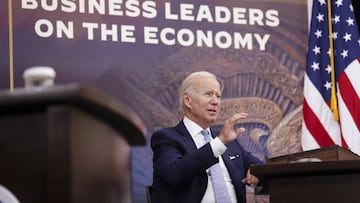US Economy: What is a recession? How does it affect your day to day?
New GDP data showed that the US economy shrank for a second straight quarter, leading to a kerfuffle over what is the technical definition of a recession.

There has been much talk about the US, and other major economies around the world, dipping into recession driven by inflation not seen in decades. Rising prices tend to drive down demand as goods become more expense leading to the economy shrinking. Companies end up laying off workers to salvage the bottom line until economic activity picks up again.
On Thursday the Bureau of Economic Analysis (BEA) released GDP data for the second quarter of 2022 showing a 0.9 percent decline, the second straight after a 1.6 percent drop in the first quarter. With the US reporting two straight quarters of GDP decreasing, the US economy is in a recession technically speaking, right? Well, that depends on who you ask.
Also see:
This isn’t your typical economic cycle
The world economy since covid barged onto the stage has been anything but normal. Pandemic restrictions sent national economies into freefall around the globe and the US was no different. The US experienced its briefest recession in history though, rebounding at a lightning pace as the federal government and central bank put in place unprecedented stimulus policies.
The US stock market saw spectacular growth as the central bank flooded the market with liquidity and kept interest rates close to zero. A job market that was devastated by the virus, exploded seeing an historic streak of monthly gains. There are more jobs available than there are people available to fill them which has helped wages shoot up, especially at the lowest tier. The strong job and wage growth is part of the reason the Fed is being so aggressive at hiking interest rates.
It feels like a recession
The kerfuffle about whether or not the US economy is in a recession boils down to what just about everything does these days, a proclivity for one side or the other of the political spectrum. There are claims on the right that the Biden Administration has “redefined” what a recession is to gloss over the drop in GDP.
But politics aside, you may just generally feel gloomy about the economic outlook, which isn’t hard to fathom given inflation hitting highs not seen in four-decades and the Federal Reserve scrambling to wrestle it down using aggressive rate hikes.
According to a recent Morning Consult/Politico poll, a majority of Americans, 65 percent, believe that the US is in a recession. Those before mentioned rate hikes sent the stock markets into a bear territory after hitting all-time highs, and for those who’ve invested in cryptocurrency it has been downright awful, especially for the unfortunates that jumped on the train when it was at its peak.
So, is the US in a recession?
The definition of a recession according to the National Bureau of Economic Research (NBER), considered the ultimate arbitrators of what is and is not a recession, “three criteria—depth, diffusion, and duration—needs to be met individually to some degree, extreme conditions revealed by one criterion may partially offset weaker indications from another.” The nonprofit research organization, that is not affiliated with the federal government, takes into account many factors, including consumer spending, employment, GDP, industrial production, and real income in its determination
Looking at the job growth or decline part of the equation, the US labor market continued to add more new payrolls than expected in June along with increasing wages. As for spending, according to Stephen Squeri, CEO of American Express, sales have risen 31 percent year-on-year in the credit card company’s most recent report and was matched by similar spending trends by members.
But yes, parts of the economy are beginning to slow like the housing market that was starting to look bubbly with values overvalued in many markets. But Squeri for his part doesn’t see any signs of a big slowdown in the economy overall. “But if we learned anything during the pandemic, you kind of go day-to-day, month-to-month,” he said.
Fed rate hikes may throw the US economy into recession
One of the main concerns is that the rapid rate hikes being implemented by the Fed could go too far and plunge the US economy into a recession. Chairman Jerome Powell has said that would be the lesser of two evils, continued runaway inflation being a scarier prospect.
What would it mean if the US economy were to go into a recession? Unemployment, which is currently at 3.6 percent, would rise. With more people competing for fewer jobs, as opposed to the present situation, wage growth would slow as those hiring would be back in the driver’s seat.
Ideally, to bring inflation under control, demand would be driven down as fewer people have money in their pockets to make big purchases. However, that would mean more hardship for people still recovering from the aftermath of the pandemic-induced recession two years ago. Those who are gaining most right now, those at the lower end of the economic ladder would be the ones to feel the impact of the recession the most with less of a cushion to soften the blow.






